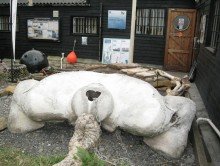Dorset Wildlife Trust (DWT) has recovered the skull of the first ever fin whale to be recorded dead or alive in Dorset, to help raise awareness about the decline of marine giants.
The giant skull, which is now part of a display at the Fine Foundation Marine Centre, Kimmeridge, belongs to a juvenile fin whale washed up on shore in the Purbeck Marine Wildlife Reserve back in October 2012. Dorset Wildlife Trust is using the skull to educate adults and children about endangered marine giants and raise awareness of the importance of Marine Conservation Zones along the Dorset coast.
DWT Marine Awareness Officer Julie Hatcher, who helped recover the fin whale, said: “The exhibition is a really unique way of learning more about fin whales and what more we can do to protect them. Even though our skull is that of a juvenile, its body was still nearly 14 metres in length which helps put into perspective just how big these animals are.”
“After receiving permission from relevant authorities, such as DEFRA, we carried out the task to remove what was left of the skull from the shoreline. Due to its exceptional size and weight, it required a carefully planned operation, a boat and four people to transport it back to its new home at the Marine Centre.”
“Whilst it’s exciting that we can still see marine giants such as whales and dolphins here in Dorset, there was a time when they were much more common. We believe that we could get back more of these big marine animals by protecting their important feeding and nursery grounds through a national network of Marine Conservation Zones.”
Known as the ‘greyhounds of the sea’, Fin whales can swim up to 30mph in short bursts when alarmed, or they will swim at an average speed of 18mph during migration, when they cover around 90 miles per day. They are the second largest animal on the planet after the blue whale, and can measure up to 27 metres long and weigh up to 85 tonnes. Like many marine mammals, fin whales are at risk from ‘whaling’, ship-strike and entanglement in fishing gear. With their population dropping so low they are now listed as an endangered species.
The Fin Whale skull and other artefacts, including vertebrae, can be seen at the Fine Foundation Marine Centre in Kimmeridge, which is open10.30am to 5pm Tuesday to Sunday plus Bank Holidays during the school holidays.
(Postcode BH20 5PF; Map reference SY 909787) For more information phone 01929 481044.
To find out how you can support Marine Conservation Zones visit: https://www.wildlifetrusts.org.uk/MCZfriends












